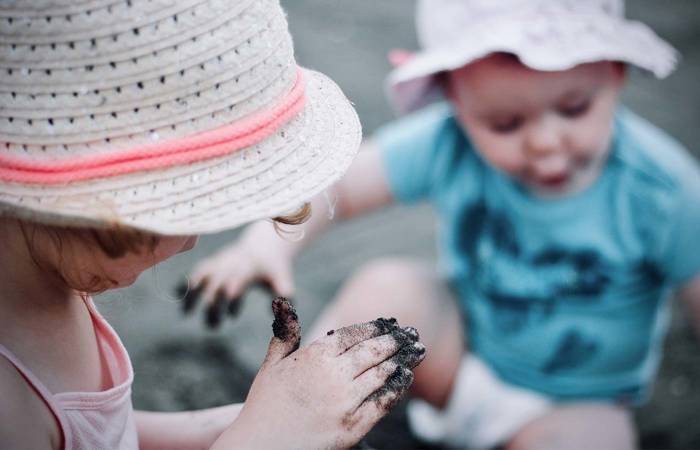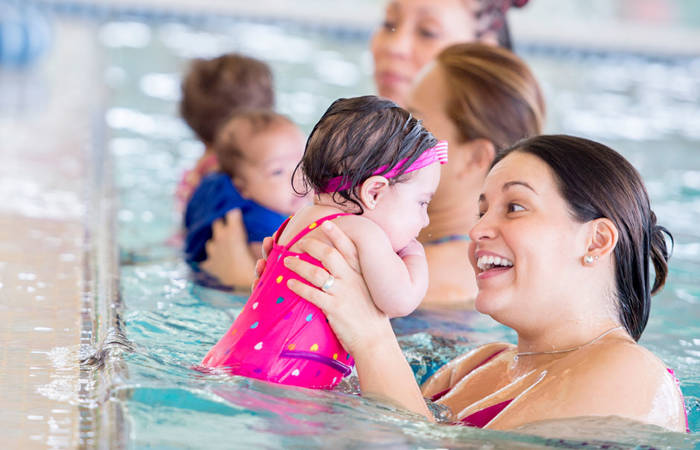Like what you see?
Sign up to receive more free parenting advice.
Thank you for subscribing to our newsletter!
Lifestyle
As parents, you know that secure attachments1 are critical, but as your child enters early learning, developing positive relationships with educators are vital.
You want the best for your children and finding a quality centre that supports their learning and meets your family needs is a high priority.
It’s no secret that central to quality are the educators working with your child and their specialist knowledge, skills and capacity to nurture a positive relationship with your child and family.
Relationships are the foundation of high quality education and care and integral to achieving the best outcomes for children. We know that a secure attachment2 between children and parents is critical to their current and future learning and wellbeing.
While this continues to be the most important relationship in the child’s life, we need to help children to build a secure attachment with educators at their centre. Children who feel safe and secure are able to explore their new environment, interact with others and learn more.
While services and educators are expected to play a leading role, there is a lot that parents can do to support and strengthen this relationship.
The goal is a genuine partnership
In the past, the idea of relationships with families in education and care was rather one-sided. Centres were viewed simply as services providing information about child development and learning to parents.
Educators were seen to have the qualifications and expertise and parent involvement was determined by the service. Today, it is recognised that parents know their child better than anyone else and their knowledge and understanding supports educators to do their work.
We also know that parents, not educators, have the greatest influence on children’s learning and wellbeing. So, it makes sense that to achieve and sustain the best outcomes for children, educators and parents need to work together.
The national Early Learning Framework (DEEWR, 2009)3 offers a picture of what this looks like in practice4. In a genuine partnership, parents and educators value each other’s knowledge and contribution to the child’s life. They build trust and engage in regular, open and respectful communication. They share insights and perspectives about the child and work together to make decisions that support the child’s learning and wellbeing.
So what do you want from a partnership with your centre? A study5 involving 200 Queensland parents found that parents wanted to have trust and confidence in their service and to engage in open and honest communication.
While recognising the partnership was a shared responsibility, they expected their service to take the lead and provide opportunities for them to participate. They wanted regular information about their child’s day and learning progress and opportunity to have a say in what was happening for their child at the centre.
They talked about the benefits of working with educators “to provide a happy, safe and caring environment for their child” and “to promote their child’s learning and development”.
We also know that parents, not educators, have the greatest influence on children’s learning and wellbeing. So, it makes sense that to achieve and sustain the best outcomes for children, educators and parents need to work together.Dr Susan Irvine
What can parents do to establish and nurture this relationship?
Relationships count, and children, parents and educators all benefit when there are genuine partnerships. So how can you help to build a strong and positive relationship with your child’s educators?
Think about your centre as a place for families with young children. Find a centre that feels welcoming to you and your child, where you feel comfortable and able to form relationships with those caring for your child. You don’t need to become firm friends, although this can happen outside of the centre. It is more about respecting and valuing each other’s roles and being able to work together to support the best outcomes for your child.
1. Ask for a copy of the centre philosophy
This will tell you about the beliefs and values that underpin practice at the centre. Reading this will help you to get to know your centre and how educators will work with your child and family.
It may also prompt questions. For example, the philosophy may include a commitment to work in partnership with families. You might want to ask more about this. For example, how do educators build this partnership? What can parents do to support the partnership? Share your hopes, expectations and priorities for your child.
2. Try to get a sense of staff continuity
Ask about the experience of educators and how long they have been at the centre. Ask about staffing at the centre, and who will be your child’s primary carers. While some changes are to be expected, it’s hard to build strong and trusting relationships if your child’s educators are continually changing.
3. Help educators to get to know your child and family
While educators will have a range of strategies to support successful transition, sharing your knowledge will help them to support your child. Your centre is likely to be interested in what your child enjoys doing, things that interest them, any concerns they have about starting at the centre and what helps if they feel worried or sad about something. It’s a good idea to think about this ahead of time.
4. Keep enrolment forms up to date
Form filling is nobody’s favourite activity, but enrolment forms are a vital source of information. Take time to complete these and remember to keep your information up to date. It is important that the centre is able to contact you.
5. Ask how information is shared at the centre?
Ask how the centre shares information with families and how you can communicate with your child’s educators. It is recognised that families have different needs and expectations when it comes to information sharing. You should be able to choose ways that suit you and your family. This may include talking with educators when your drop off and collect your child, arranging a time to meet for longer conversations, using technology (e.g. email, SMS, Storypark), reading notes and noticeboards and writing in a communication book. Let the centre know how you would prefer to share and receive information.
Introduce yourself to your child’s educators. Share a little about yourself and get to know them as people. Show that you value the important work they do and be sure to say hello and goodbye when you are dropping off and picking up your child.
Stay in touch. Regular and ongoing communication is important and this can be initiated by you or the centre. It is critical to make time for conversations, but when these happen needs to be negotiated. Most parents say they like to chat with educators at the beginning and end of their child’s day and find this is the most convenient way to share information.
Educators also say they value these conversations, which help them to build their knowledge of children and relationship with families. However, it is important to respect educators’ professional responsibilities. Remember, mornings can be a very busy time and their main priority will be to help children to transition from home to the centre.
Be mindful of their need to care for the group. A brief chat is fine, but it is better to arrange another time to meet for longer conversations. Similarly, remember that educators have personal and family responsibilities too, and may not be able to engage in a spontaneous extended conversation at the end of their work day.
6. Show your appreciation
Show your appreciation when you see educators caring for your child or notice that your child has learned something new. Remember, all educators need to be qualified. Some hold vocational qualifications in early childhood education and care, some will be degree-qualified early childhood teachers.
Let them know that you value their contribution to your child’s learning. Ask questions about your child’s current play and learning. Ask them how you can support their learning at home. Tell educators about things that interest, excite or challenge your child outside of the centre your child. Let them know your hopes, expectations and priorities for your child’s learning and discuss ways that you can work together to extend learning.
Getting the most of your centre
To get the most out of your centre, think of yourself as a member of the centre community with rights and responsibilities. Sure, your centre needs to comply with national quality standards and you have rights as a consumer of the service, but this is also about the care and education of your child. This is a shared responsibility where educators and families need to work together.
The evidence is clear. Children whose families are interested and involved and build strong and positive relationships with their child’s educators learn and achieve more. This is true in all areas of education, so start well by committing to this partnership at your early childhood centre.
1 Circle of Security International. (n.d) Circle of Security: Early Intervention Program for Children and Parents. Retrieved from https://www.circleofsecurityinternational.com/
2 Circle of Security International. (n.d) Circle of Security: Early Intervention Program for Children and Parents. Retrieved from https://www.circleofsecurityinternational.com/
3 DEEWR, (2009). Belonging, being and becoming: The Early Years Learning Framework for Australia. Retrieved from https://www.acecqa.gov.au/sites/default/files/2018-02/belonging_being_and_becoming_the_early_years_learning_framework_for_australia.pdf
4 ACECQA, (2016). Quality Area 6: Building partnerships with families. Retrieved from http://files.acecqa.gov.au/files/QualityInformationSheets/QualityArea6/QualityArea6BuildingPartnershipsWithFamilies.pdf
5 Irvine, S. (2012). The family participation in child care project. In the Loop, Autumn, pp. 9-14. Retrieved from https://eprints.qut.edu.au/54786/1/The_Family_Participation_in_Child_Care_Project_In_the_Loop_final_100212.pdf

Dr Susan Irvine
QUT Associate Professor in the School of Early Childhood and Inclusive Education
See more






